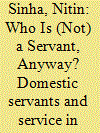|
|
|
Sort Order |
|
|
|
Items / Page
|
|
|
|
|
|
|
| Srl | Item |
| 1 |
ID:
178703


|
|
|
|
|
| Summary/Abstract |
The article deals with one of the under-researched themes of Indian history, which is the history of domestic servants. Thinking about servants raises two fundamental questions: who were they and what did domestic service mean? The identities of a servant as a contract wage earner or a person either belonging as a member or tied to the family through fictive/constructed claims of kinship were not mutually exclusive. Servants' identity existed in a continuum running from ‘free’ waged coolie on the one hand to ‘unfree’ slave on the other. The article traces the history of domestic servants along two axes: the slave–servant continuum, but, more importantly, the coolie–servant conundrum, which is a lesser-explored field in South Asian labour history or burgeoning scholarship on domesticity and household. Charting through the dense history of terminologies, the space of the city, and legal frameworks adopted by the Company state to regulate servants, it also underscores the difficulties of researching on a subaltern group that is so ubiquitous yet so fragmented in the archives. In order to reconstruct servants' pasts, we need to shake up our own fields of history writing—urban, labour, gender, and social—to discover servants’ traces wherever they are found. From serving as witnesses in courtrooms to becoming the subject of a city's foundational anecdote, their presence was spread across straw huts, streets, and maidans. Their work, defined through ‘private hire’, was the product of a historical process in which a series of regulations helped to intimatize the master-servant relationship.
|
|
|
|
|
|
|
|
|
|
|
|
|
|
|
|
| 2 |
ID:
084841


|
|
|
|
|
| Publication |
2008.
|
| Summary/Abstract |
This paper uses a study of strikes of railway workers in Bihar and Bengal from 1918 to 1922 to set out and examine the complexities of workers' politics. Three broad themes related with workers' politics, viz. racial ideology, actual 'event' of striking and the related activities of workers, and techniques of mobilization have been covered in this paper. In each of these cases, it has been argued that rigid categories like racialism or nationalism are of little help in unravelling the complexities of workers' choices and their politics. Their politics were more flexible than what meets the eye, and their choices were created through dialogue, if not determined by the various factors surrounding them. However such choices were also being limited by the larger context provided by the ideologies and institutions of racialism, nationalism, and colonialism.
|
|
|
|
|
|
|
|
|
|
|
|
|
|
|
|
|
|
|
|
|